NATO summit ends in London. But differences remain among the 29 members of the military alliance.
LONDON, Dec. 4 (Xinhua) -- The North Atlantic Treaty Organization (NATO)'s 70th birthday summit came to a "crash, bang, wallop" end Wednesday in London, with U.S. President Donald Trump leaving early.
The two-day showpiece event, which was aimed at creating harmony among the 29 members of the alliance, has been instead surrounded by discords and squabbles, with leaders of key allies, such as France, the United States and Turkey, involved in a series of verbal exchanges.
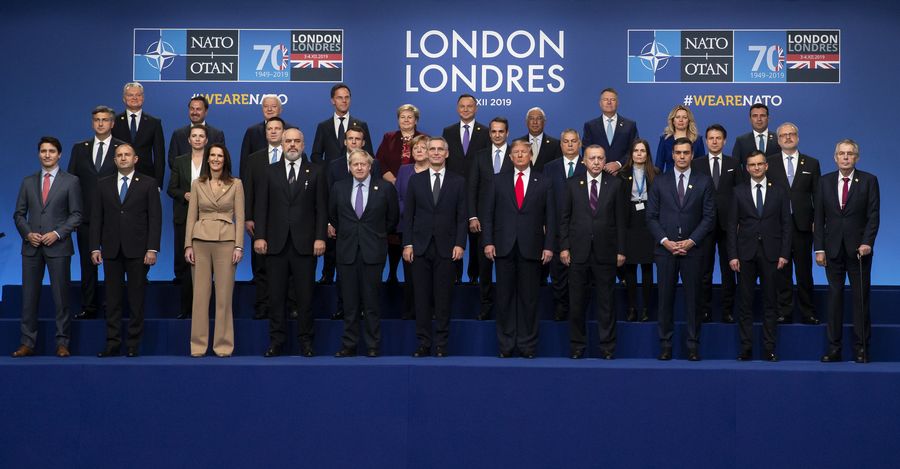
NATO (North Atlantic Treaty Organisation) leaders pose for a group photo at the NATO Summit in London, Britain, on Dec. 4, 2019. (Xinhua/Han Yan)
"BRAIN DEAD" BLOC, "TWO-FACED" ALLY
Planned months in advance as a celebration of the military alliance's togetherness in a changing and challenging world, the London Summit made world headlines even before it started.
In an interview earlier this month with The Economist magazine, Macron said the NATO is "brain dead" and called for a rapprochement with Russia and a pause of European Union enlargement.
Macron reiterated his opinion at the summit's main event at Watford, north of London, drawing a rebuff from Trump at the somewhat acrimonious summit.
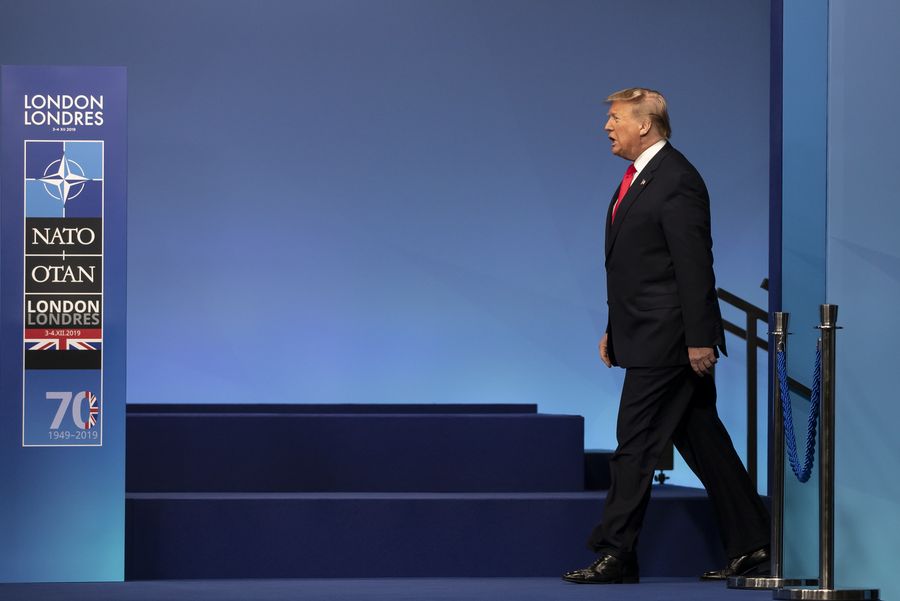
U.S. President Donald Trump arrives for the official handshake ceremony at NATO (North Atlantic Treaty Organisation) Summit in London, Britain on Dec. 4, 2019. (Xinhua/Han Yan)
"President Macron said NATO was brain dead. I think that's very insulting. I was very surprised," Trump told a gathering of international journalists.
"It's a tough statement, but when you make a statement like that, that was a very very nasty statement to make to 28 countries. You just can't go around making statements like that about NATO. It's very disrespectful," he added.
Their squabbling continued till the very last minute after the 29 leaders of the member states completed their three-hour gathering behind closed doors at a luxury golf hotel complex.
Instead of debating global issues requiring attention by NATO, the big event was marred by yet another spat -- this time between next door neighbors -- Trump and his Canadian counterpart from just across the border.
Canadian Prime Minister Justin Trudeau was overheard in a video during a reception Tuesday night at Buckingham Palace, which was apparently deriding Trump's habit of lengthy impromptu press conferences, though he did not mention the U.S. president by name.
In retaliation, Trump called Trudeau "two-faced." He suggested that Trudeau's overheard comments were precipitated by his decision to highlight the fact that Canada falls short of NATO goals on defense spending.
"The truth is that I called him out on the fact that he's not paying 2 percent and I guess he's not very happy about it," Trump said.
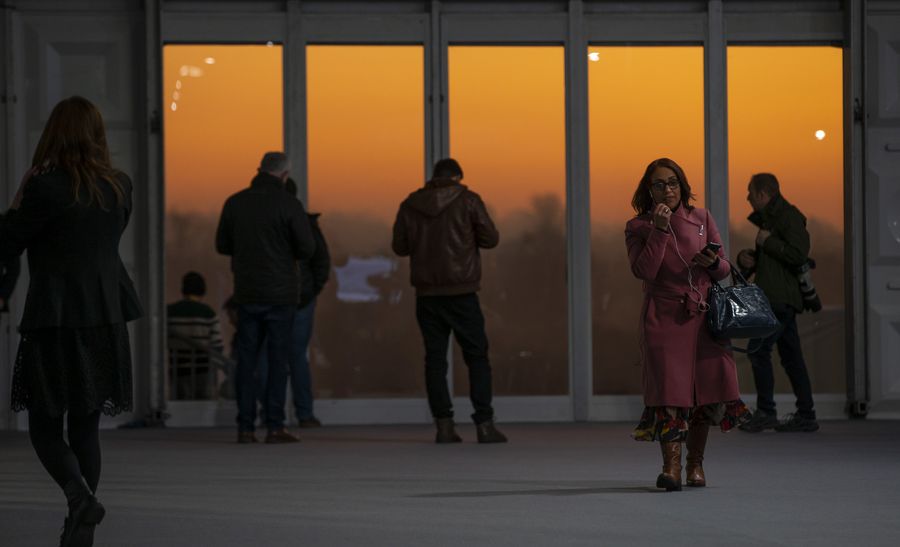
Photo taken on Dec. 4, 2019 shows the Media Centre for the NATO (North Atlantic Treaty Organisation) Summit in London, Britain. (Xinhua/Han Yan)
Trump left early for Washington during the summit, while the international journalists had already started to gather for an expected press conference during which Trump was scheduled to give his take on progress made at the summit.
Trump's explanation didn't stop most media linking his early departure with the Trudeau incident. Media reports said that Trump did not look amused when journalists asked him earlier about the video.
Dan Sabbagh, the Guardian's defense and security editor, commented that "normally this is an arena that would be dominated by Donald Trump, although this time he was somewhat upstaged by Emmanuel Macron, whose pre-summit declaration that the organization had become 'brain-dead' obliged Trump to describe his French counterpart's comments as 'very, very nasty.'"
NOWHERE TO HIDE DIFFERENCES
The declaration issued at the conclusion of the London Summit made no mention of the differences of opinion, calling for unity and cohesion.
In the less-than-1,000-word London Declaration, NATO gave itself a huge pat on the back for its past record, describing itself as the strongest and most successful alliance in history.
"We, as an Alliance, are facing distinct threats and challenges emanating from all strategic directions," the document declared, adding that "solidarity, unity, and cohesion are cornerstone principles of our alliance." 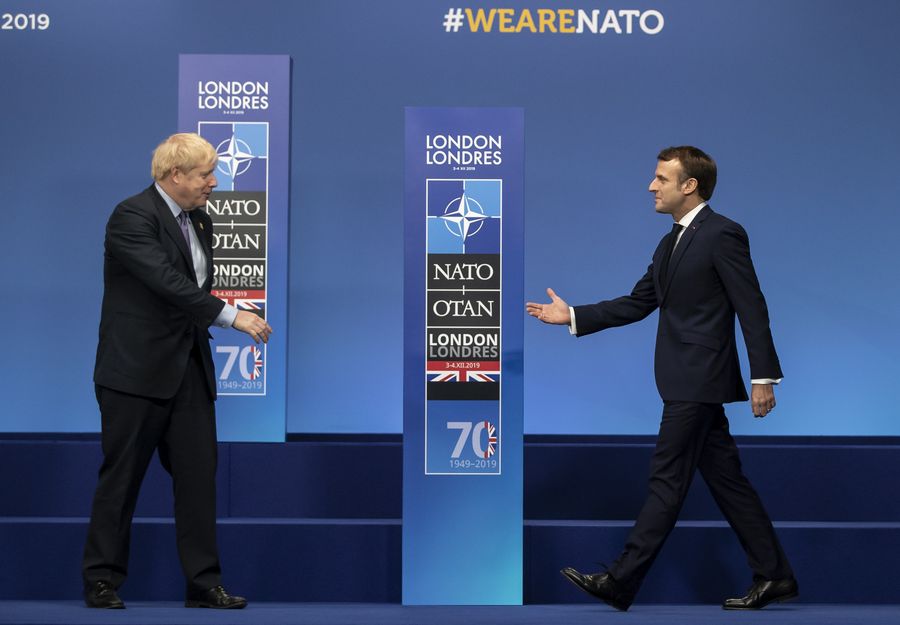
British Prime Minister Boris Johnson (L) welcomes French President Emmanuel Macron at the official arrivals for NATO (North Atlantic Treaty Organisation) Summit in London, Britain on Dec. 4, 2019. (Xinhua/Han Yan)
NATO Secretary General Jens Stoltenberg admitted that the organization has to change to adapt to the challenges. "As the world changes, NATO will continue to change," he said during the summit.
According to the declaration, NATO and its allies are committed to ensuring the security of telecommunications, recognizing the need to rely on secure and resilient systems. It also declared space an operational domain for NATO, adding that as long as nuclear weapons exist, NATO will remain a nuclear alliance.
But British Prime Minister Boris Johnson's description was in sharp contrast to the extensive coverage of acrimonious verbal attacks.
The prime minister, at his press conference, navigated his way through questions praising Britain's close relationship with the United States without once using Trump's name.
The Spectator, in its analysis headlined "Johnson survives the NATO hot potato" said the summit had drawn to a close, and Johnson could breathe a sigh of relief.
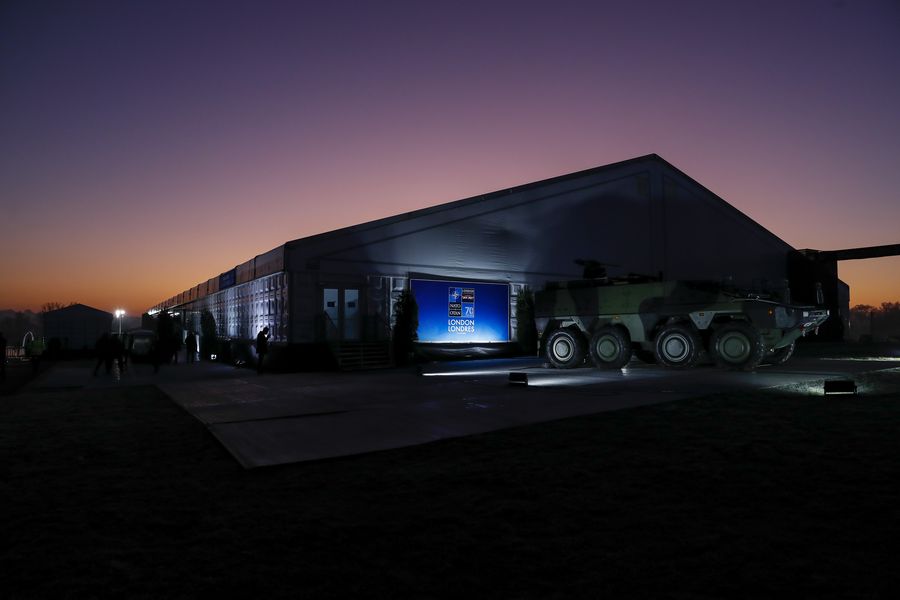
Photo taken on Dec. 4, 2019 shows the Media Centre for the NATO (North Atlantic Treaty Organisation) Summit in London, Britain. (Xinhua/Han Yan)
"Thanks in part to Donald Trump canceling his planned press conference today (possibly because leaders, including Johnson, were caught on a hot mic apparently mocking him), the Prime Minister hasn't had to contend with any major controversies involving the US President with just over a week to go to polling day," the analysis said.
Political commentators had speculated that Johnson would attempt to avoid being drawn into commenting on Trump on the basis that seeming to be too supportive of Trump, could harm his own campaign for the Dec. 12 general election.
DISAGREEMENTS OVER TODAY & FUTURE OF ALLIANCE
The summit tried to keep members on the same page after a series of disagreements, particularly regarding Turkey, in recent months.
Ahead of the summit, Turkish President Recep Tayyip Erdogan had said he would oppose a NATO defense plan for the Baltic region and Poland if the alliance did not support his country over its fight against Kurdish groups in Syria.
Macron had earlier confronted Erdogan with a direct warning that Ankara's recent behavior was not compatible with its NATO membership.
In his post-summit briefing, Stoltenberg said that the alliance had been able to resolve the disagreement with Turkey, allowing NATO's plans to go ahead.
Defense spending is another focus of contradiction.

NATO Secretary General Jens Stoltenberg (L) talks with British Prime Minister Boris Johnson during the official handshake ceremony at NATO (North Atlantic Treaty Organisation) Summit in London, Britain on Dec. 4, 2019. (Xinhua/Han Yan)
Trump has frequently criticized NATO members for falling well short in doing their financial part through his presidency, and he was eager to take credit for recent increases in defense spending by alliance members.
After a NATO summit last year, he called for members to devote at least 4 percent of GDP to military spending. At this year's summit, he told reporters that "I don't think, frankly, before us, that NATO was changing at all, and NATO is really changing right now."
While NATO leaders emphasized unity, Trump convened his own sub-group of the alliance, limited to only those who had met the defense spending target.
With public rows over France's criticism of the alliance, Turkey's offensive in Syria and uncertainty over the U.S. commitment to the trans-Atlantic defence, cracks overshadowed occasions and dented the alliance's credibility.
Besides, Germany and France clashed over whether Europe can defend itself on its own. Some may heed Macron's wake-up call while others have dismissed it. The United States has pushed European members to contribute more to defense expenditure and even hinted a withdrawal from the bloc.
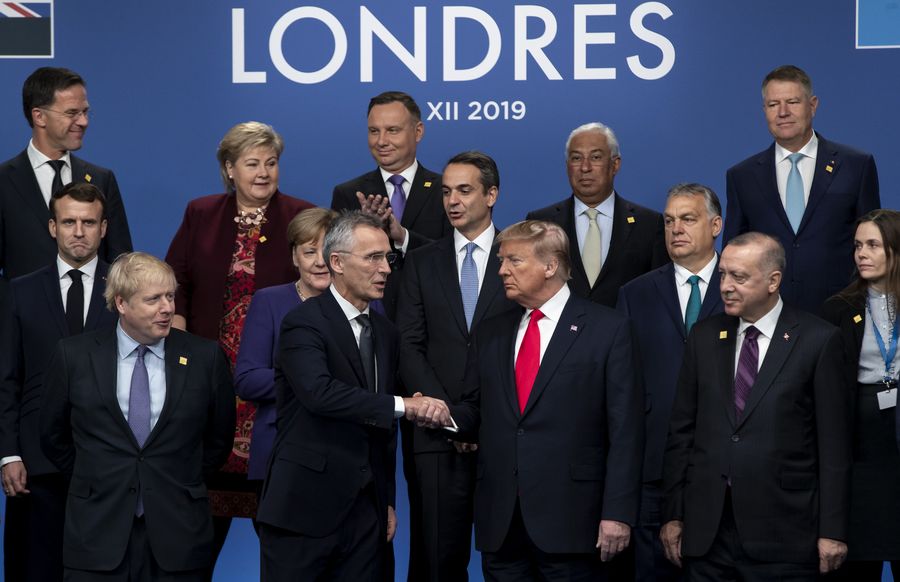
NATO Secretary General Jens Stoltenberg (2nd L, front) shakes hands with U.S. President Donald Trump (2nd R, front) during a group photo at NATO (North Atlantic Treaty Organisation) Summit in London, Britain on Dec. 4, 2019. (Xinhua/Han Yan)
The 29 members have developed fundamental disagreements over the alliance's future and many have questioned the unity and political willingness to stand together.
NATO optimists say the bloc has outlived other major military alliances to celebrate the 70th anniversary, but many clues have shown there is no guarantee that it will thrive and prosper in the years to come. ■



